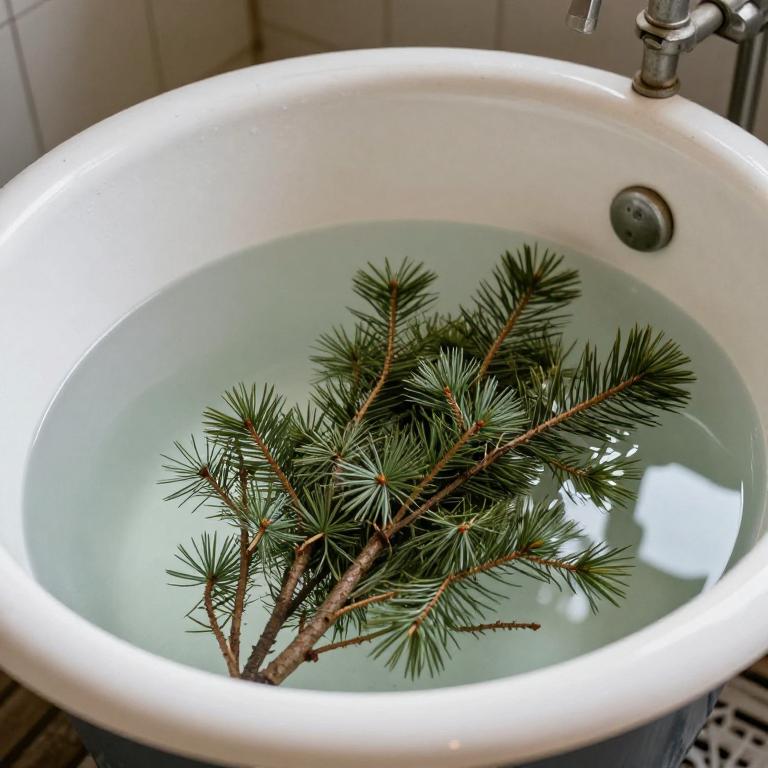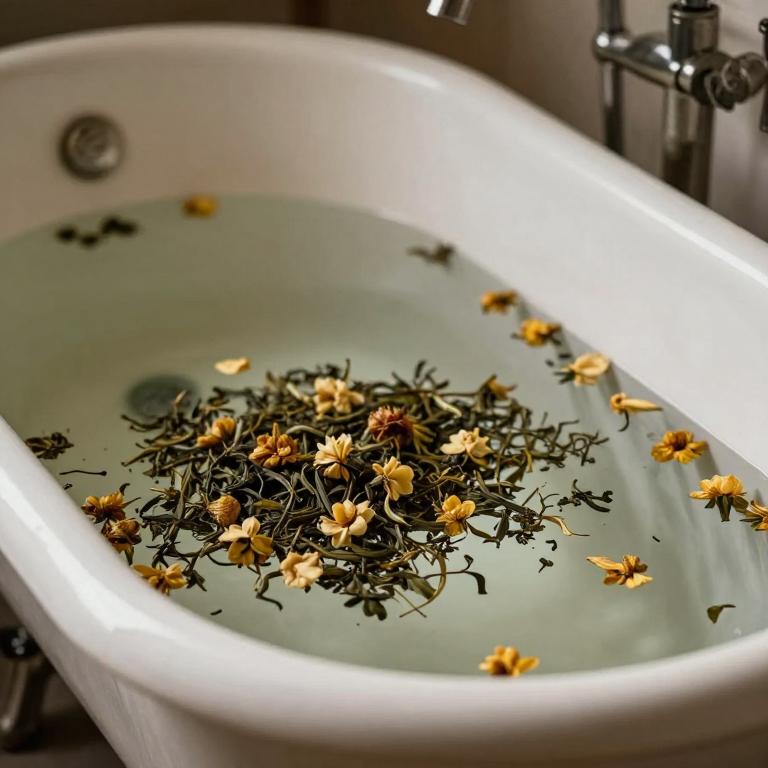10 Best Herbal Baths For Bronchitis

Herbal baths can be a soothing and supportive treatment for individuals suffering from bronchitis, as they help to ease respiratory discomfort and promote relaxation.
Certain herbs, such as eucalyptus, lavender, and chamomile, are commonly used in these baths due to their anti-inflammatory and decongestant properties. Soaking in warm water infused with these herbs can help open up airways, reduce inflammation, and alleviate coughing. While herbal baths are not a substitute for medical treatment, they can complement conventional therapies and improve overall well-being.
It is important to consult with a healthcare provider before incorporating herbal baths into a treatment plan, especially for those with severe or chronic bronchitis.
Table of Contents
- 1. Eucalyptus (Eucalyptus globulus)
- 2. Thyme (Thymus vulgaris)
- 3. Peppermint (Mentha piperita)
- 4. Salvia (Salvia officinalis)
- 5. Rosemary (Rosmarinus officinalis)
- 6. Ginger (Zingiber officinale)
- 7. Ceylon cinnamon (Cinnamomum zeylanicum)
- 8. Scots pine (Pinus sylvestris)
- 9. Stinging nettle (Urtica dioica)
- 10. Camellia (Camellia sinensis)
1. Eucalyptus (Eucalyptus globulus)

Eucalyptus globulus, commonly known as Australian tea tree or blue gum, is often used in herbal baths to alleviate symptoms of bronchitis due to its potent anti-inflammatory and antimicrobial properties.
When added to warm water, the essential oil of eucalyptus globulus can help open up the airways and reduce congestion, making it easier to breathe. The aromatic compounds in the oil, such as cineole, are believed to stimulate the respiratory system and ease coughing. Taking a eucalyptus globulus herbal bath can also promote relaxation and reduce overall stress, which may indirectly support respiratory health.
While it is not a substitute for medical treatment, it can serve as a complementary therapy to ease discomfort associated with bronchitis.
2. Thyme (Thymus vulgaris)

Thymus vulgaris, also known as thyme, is a popular herb used in herbal baths for its potential therapeutic benefits, particularly for respiratory conditions like bronchitis.
The essential oils and compounds in thyme, such as thymol and carvacrol, are believed to have antimicrobial and anti-inflammatory properties that may help soothe irritated airways. When used in a warm herbal bath, thyme can promote relaxation and ease breathing by reducing congestion and inflammation in the respiratory system. The steam from the bath helps to open up the airways, making it easier to breathe and potentially alleviating symptoms of bronchitis.
While herbal baths can be a complementary therapy, they should not replace conventional medical treatments for bronchitis, and it is advisable to consult a healthcare professional before use.
3. Peppermint (Mentha piperita)

Mentha piperita, commonly known as peppermint, has been traditionally used in herbal baths to alleviate symptoms of bronchitis by promoting respiratory comfort and reducing congestion.
The essential oils from fresh or dried peppermint leaves are often infused into warm water, creating a soothing bath that can help ease coughing and improve airflow. The cooling effect of peppermint can help relax the muscles around the airways, making it easier to breathe and reducing inflammation. Additionally, the aromatic compounds in peppermint may have a calming effect on the nervous system, helping to reduce stress and support overall respiratory health.
While herbal baths can offer symptomatic relief, they should be used as a complementary therapy alongside medical treatment for bronchitis.
4. Salvia (Salvia officinalis)

Salvia officinalis, commonly known as sage, has been traditionally used in herbal baths to support respiratory health, including in cases of bronchitis.
The essential oils and phytochemicals in sage possess antimicrobial and anti-inflammatory properties that may help reduce mucus production and soothe irritated airways. When infused into bath water, sage can provide a calming and therapeutic experience, promoting relaxation and easing breathing difficulties. Herbal baths with sage are believed to enhance circulation and support the body's natural healing processes.
While not a substitute for medical treatment, these baths may serve as a complementary therapy to alleviate symptoms associated with bronchitis.
5. Rosemary (Rosmarinus officinalis)

Rosmarinus officinalis, commonly known as rosemary, has been traditionally used in herbal baths to support respiratory health, particularly in cases of bronchitis.
The essential oils found in rosemary, such as camphor and pinene, possess antimicrobial and anti-inflammatory properties that may help reduce mucus production and soothe irritated airways. When used in a warm bath, these compounds can be absorbed through the skin, promoting relaxation and easing breathing difficulties. Herbal baths with rosemary are often combined with other respiratory-supporting herbs like eucalyptus or thyme for enhanced benefits.
However, it is important to consult with a healthcare provider before using rosemary baths, especially for individuals with sensitive skin or underlying health conditions.
6. Ginger (Zingiber officinale)

Zingiber officinale, commonly known as ginger, has been traditionally used in herbal baths to support respiratory health, including in cases of bronchitis.
The warming properties of ginger help to soothe inflamed airways and reduce congestion, making it a natural remedy for easing symptoms. When infused into bath water, ginger can promote relaxation and improve circulation, which may aid in the body's healing process. Its anti-inflammatory and antioxidant compounds may help reduce irritation and mucus production in the respiratory tract.
While herbal baths can complement conventional treatments, they should not replace medical advice, especially for severe or chronic bronchitis.
7. Ceylon cinnamon (Cinnamomum zeylanicum)

Cinnamomum zeylanicum, commonly known as Ceylon cinnamon, has been traditionally used in herbal baths to support respiratory health, including alleviating symptoms of bronchitis.
The essential oils derived from this plant possess antimicrobial and anti-inflammatory properties that may help reduce inflammation in the airways and combat bacterial or viral infections. When incorporated into a warm herbal bath, the aromatic compounds can be absorbed through the skin, promoting relaxation and easing respiratory discomfort. The soothing heat of the bath further helps to open up the airways and ease coughing.
While not a cure, Ceylon cinnamon baths may serve as a complementary therapy to support overall respiratory wellness when used alongside conventional treatments.
8. Scots pine (Pinus sylvestris)

Pinus sylvestris, commonly known as Scots pine, has been traditionally used in herbal baths to support respiratory health, particularly in cases of bronchitis.
The essential oils extracted from its needles contain compounds like alpha-pinene and beta-pinene, which possess anti-inflammatory and decongestant properties. When infused into bath water, these oils can help soothe irritated airways and ease breathing difficulties associated with bronchial inflammation. The warmth of the bath also promotes relaxation and may enhance the absorption of these beneficial compounds through the skin.
While not a substitute for medical treatment, pine-infused baths can serve as a complementary therapy to alleviate symptoms and support overall respiratory wellness.
9. Stinging nettle (Urtica dioica)

Urtica dioica, commonly known as stinging nettle, has been traditionally used in herbal baths to support respiratory health, including conditions like bronchitis.
When infused into bath water, stinging nettle is believed to help reduce inflammation and soothe irritated airways by promoting detoxification and improving circulation. The anti-inflammatory and antioxidant properties of nettle may help alleviate symptoms such as coughing and congestion associated with bronchitis. Herbal baths with urtica dioica can also help relax the muscles around the bronchi, easing breathing difficulties.
While not a substitute for medical treatment, these baths may serve as a complementary therapy to support overall respiratory wellness.
10. Camellia (Camellia sinensis)

Camellia sinensis, commonly known as the tea plant, has been traditionally used in herbal remedies for its potential therapeutic properties.
While it is best known for producing tea, some herbal baths incorporating Camellia sinensis may offer soothing benefits for respiratory conditions like bronchitis. These baths are believed to help reduce inflammation and ease breathing by promoting relaxation and improving circulation. However, there is limited scientific evidence supporting the effectiveness of Camellia sinensis in treating bronchitis specifically.
As with any herbal remedy, it is advisable to consult a healthcare professional before using it as part of a treatment plan for bronchitis.